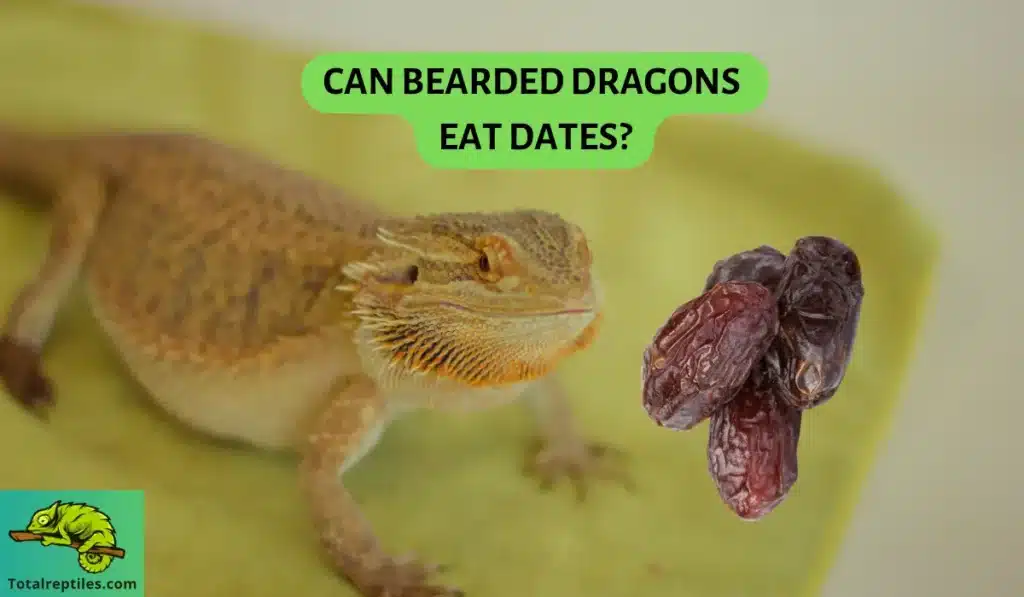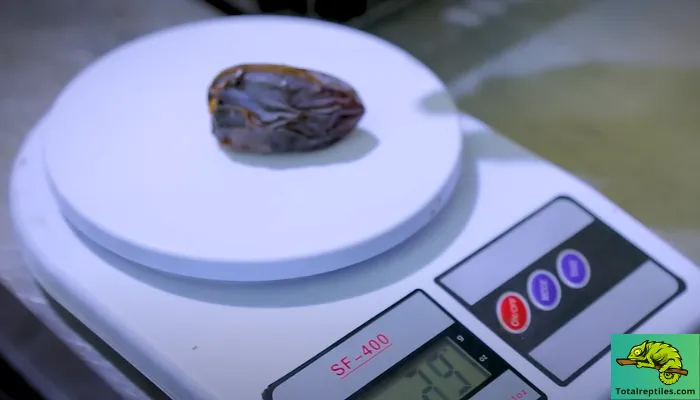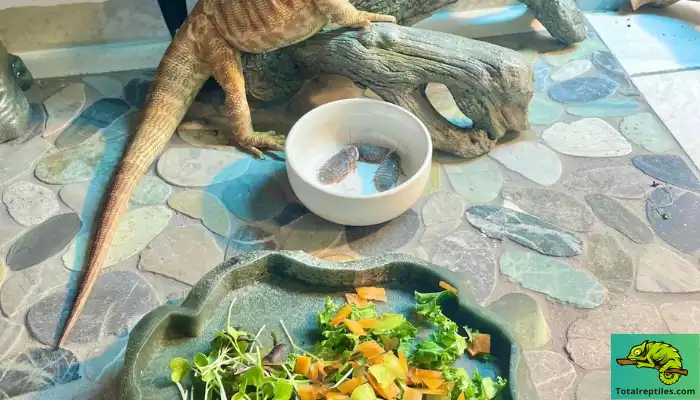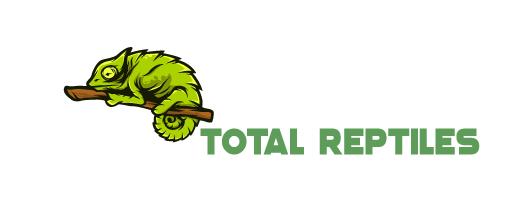Yes, bearded dragons can eat dates! These sweet, wrinkly fruits make for a tasty occasional treat. Dates provide beneficial fiber, vitamins, and minerals that beardies need. Though with their high sugar content, feeding in moderation is important.
Omnivorous bearded dragons eat a variety of foods. Fruit is occasionally eaten, but they mostly eat greens, veggies, and insects. These delicious fruits are a welcome change.
This article discusses the feeding dates of bearded dragons pros and cons.

Nutritional Benefits of Dates for Bearded Dragons
Dates may be sweet, but they pack a serious nutritional punch. Below is a nutritional breakdown per 100g serving.
| Nutrient | Amount in 100g | % Daily Value for Bearded Dragon* |
| Calories | 282 | 14% |
| Protein | 2g | 4% |
| Fat | 0.4g | 2% |
| Carbs | 75g | 25% |
| Fiber | 8g | 32% |
| Vitamin A | 149 IU | 30% |
| Vitamin C | 2mg | 4% |
| Calcium | 39mg | 4% |
| Iron | 1mg | 5% |
| Magnesium | 54mg | 14% |
| Potassium | 696mg | 20% |
- Fiber: Dates contain high amounts of soluble fiber. This type of fiber is responsible for many health benefits, like improved digestion. Fiber also slows the absorption of sugar to prevent blood sugar spikes.
- Potassium: This important mineral helps maintain fluid balance and regulates muscle contractions. Potassium even helps reduce high blood pressure.
- Magnesium: Magnesium plays a role in over 300 different enzymatic reactions in the body! This mineral is essential for protein and bone development.
- Iron: Iron carries oxygen throughout the body and helps prevent anemia. Bearded dragons are prone to iron deficiencies, so dates can help boost their levels.
- Vitamin A: This vitamin is essential for good vision and plays a key role in reproduction and growth. Vitamin A also keeps mucous membranes healthy.
- Vitamin B6: Pyridoxine, or vitamin B6, helps brain growth and function. It also helps produce antibodies that fight disease and is needed to make hemoglobin.
- Antioxidants: Dates contain antioxidant compounds like flavonoids that prevent cell damage by neutralizing free radicals. This protects against inflammation and cancer.
- Natural sugars: While dates are high in sugar, it’s not processed sugar. Natural glucose and fructose provide quick energy without blood sugar spikes.
With all these stellar nutrients packed inside, it’s easy to see why this fruit makes a great occasional treat for beardies.
Potential Risks of Feeding Dates
While this sweet fruit has some great nutrition, there are a few potential risks to be aware of:
- Choking hazard: The pits and seeds in dates can pose a choking risk for beardies. Their throats are smaller than ours, so they may have trouble passing large obstructions.
- Intestinal blockage: If swallowed whole, date pits may cause complete blockages in the digestive tract. This can be life-threatening and requires prompt vet care.
- Dehydration: The high fiber content can soak up moisture in the digestive tract. Coupled with the diuretic effect of potassium, too many dates could lead to dehydration.
- Diarrhea: Excessive fiber can also accelerate gut motility, leading to loose stools or diarrhea. The high sugar content may also draw extra fluid into the colon.
- Weight gain: Dates are energy-dense at around 100 calories per date. Overdoing it could easily lead to obesity over time.
- Blood sugar issues: The natural sugars may cause spikes in sensitive reptiles. This is especially concerning for bearded dragons prone to metabolic bone disease.
- Nutritional imbalances: Too many dates could displace other critical foods in a bearded dragon’s diet. Their precise ratio of veggies, insects, and supplements is important to maintain.
Monitor your bearded dragon closely when first introducing dates. If you notice indigestion, dehydration, or loose stool, stop using. As with any new food, safety comes first!
Preparing And Serving Dates
Before you let your bearded dragon sink their teeth into a fresh date, there’s some prep work required:
- Select ripe and fresh. Check for brightness of color and plump, tender texture. Avoid shriveled or overly soft.
- Wash thoroughly. Dates need a good scrubbing under running water to remove dirt, debris, and pesticide residues.
- Remove pits. Slice dates lengthwise and pop out the pit. Discard pits so your beardie doesn’t accidentally choke.
- Cut into bite-sized. This fruit is a choking hazard whole. Chop into small cubes no bigger than your nail.
- Soak dried. If using dried dates, soak in warm water for 10 minutes. This rehydrates them and softens them for eating.
- Mix with greens. Combine a few diced with your dragon’s salad. The flavors will complement each other.
- Avoid daily feeding. Dates should only be given 1-2 times per week max. Too much can cause digestive upset.
- Monitor closely. Watch to ensure your pet is tolerating well. Adjust frequency as needed.
With simple preparation tips, dates can be a tasty and nutritious occasional treat for your pet lizard. Just limit how often you offer them, as even healthy foods can be problematic in excess.
Signs Your Bearded Dragon Likes Dates
Bearded dragons can’t tell you if they’re enjoying a new treat but speak through behaviors. Watch for these signs your scaly friend is a fan:

- They chow down with gusto. If your beardie is eagerly devouring dates, they’re a clear winner. An enthusiastic appetite is a good indicator.
- Lip smacking and licking mean they like the taste. Bearded dragons have taste buds just like us, so look for these positive reactions.
- They become more alert and active when dates come out. Take note if your normally lazy dragon perks up at the sight of this fruit.
- Repeating behaviors like scratching at their bowls shows they want more. If they tap and fuss for additional dates, indulge them.
- Remaining near the food dish after eating instead of basking under their heat lamp. This demonstrates interest in the new item.
- Your dragon seems calmer and more content after eating dates, sometimes even closing their eyes in satisfaction.
- They’re willing to try date varieties like Medjool, deglet noor, honey, etc. Variety-seeking is a sign of enjoyment.
- NO post-meal vomiting, diarrhea, or tiredness. If this sweet fruit caused stomach upset, they’d avoid them.
Paying attention to your reptile pet’s unique quirks and signals allows you to determine whether new foods like dates are approved.
Best Date Alternatives for Bearded Dragons
If your bearded dragon is not a fan of dates, no worries! There are plenty of other delicious, nutritious foods they enjoy:

Vegetables
- Leafy greens like collard greens, mustard greens, kale, and chard provide calcium, vitamins, and antioxidants.
- Squash and sweet potatoes are great sources of vitamin A for eye and skin health.
- Try nutrient-rich vegetables like carrots, bell peppers, zucchini, green beans, and broccoli.
Fruits
- Bananas offer potassium, magnesium, and fiber without excessive sugar.
- Berries like strawberries and blueberries provide vitamin C and antioxidants.
- Melons like cantaloupe and honeydew supply hydration and beta-carotene.
- Mangos and papayas are packed with digestive enzymes like papain.
Proteins
- Crickets, worms, and insect larvae offer essential amino acids.
- Cooked poultry, fish, and egg dishes provide balanced nutrition.
Plants
- Clover and dandelion greens are excellent sources of calcium and vitamins.
- Alfalfa sprouts and hay aid digestion.
With such diverse, healthy options, there’s no shortage of nutritious alternatives. Variety is key for these omnivores!
Conclusion
Dates can be a nutritious occasional treat for bearded dragons when fed properly. Their fiber, vitamins, minerals, and antioxidants provide benefits not found in insects. However, moderation is crucial, as too many dates too often can cause obesity, diarrhea, and other problems.
While this sweet fruit can add variety to a bearded dragon’s diet, they should not become a dietary staple. A diverse mix of greens, vegetables, live feeders, and supplements is ideal for complete nutrition.
By following the guidance in this article, your bearded buddy can safely enjoy the sweetness of dates as part of a balanced diet.

